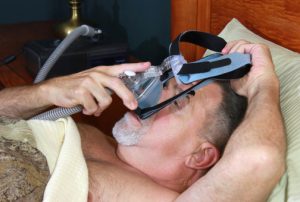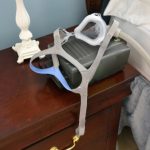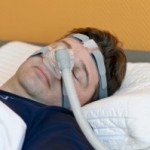 CPAP (continuous positive airway pressure) use in obstructive sleep apnea reduces atrial fibrillation recurrence. It has been observed that in patients with heart failure, high blood pressure and stroke, there is a high prevalence of sleep apnea – a sleep disorder where a person stops breathing for brief moments throughout the night.
CPAP (continuous positive airway pressure) use in obstructive sleep apnea reduces atrial fibrillation recurrence. It has been observed that in patients with heart failure, high blood pressure and stroke, there is a high prevalence of sleep apnea – a sleep disorder where a person stops breathing for brief moments throughout the night.
Although an evident relationship between heart disease and sleep apnea has been found, it is difficult to pinpoint the exact relationship as those living with sleep apnea generally tend to have other comorbid conditions as well. What has been found is that when sleep apnea is treated, the co-existing health problem improves.
Atrial fibrillation recurrence lower with obstructive sleep apnea treatment
Advertisement
 Earlier research found that atrial fibrillation recurrence is lower with obstructive sleep apnea treatment. The researchers from New York University Langone Medical Center conducted a meta-analysis of seven studies, which included 1,087 patients, to determine if CPAP use – a common treatment for sleep apnea – could reduce the recurrence of atrial fibrillation.
Earlier research found that atrial fibrillation recurrence is lower with obstructive sleep apnea treatment. The researchers from New York University Langone Medical Center conducted a meta-analysis of seven studies, which included 1,087 patients, to determine if CPAP use – a common treatment for sleep apnea – could reduce the recurrence of atrial fibrillation.
CPAP was found to reduce atrial fibrillation occurrence by 42 percent in sleep apnea patients. Although additional study is required on a larger scale, the researchers are hopeful that CPAP use could be an effective mode of treatment for reducing the occurrence of atrial fibrillation.
Study author, Larry A. Chinitz, M.D., said, “Our study confirms the expanding body of evidence that treatment of modifiable risk factors has a significant impact on the long-term suppression of atrial fibrillation regardless of the type of therapy offered.”
“Active screening for obstructive sleep apnea in all patients who undergo treatment for atrial fibrillation is imperative as the use of CPAP will influence the outcome of therapy and likely reduce some of the cardiovascular morbidity associated with atrial fibrillation. Technology for home screening of sleep apnea needs to be made widely available and become as routine as measurements of blood pressure and blood sugar levels in diabetics,” he explained.
Relationship between obstructive sleep apnea and atrial fibrillation
 There is a clear relationship between obstructive sleep apnea and atrial fibrillation, but the cause-and-effect factor is not fully understood. Over two million people have atrial fibrillation in the U.S., and one in 15 have moderate to severe obstructive sleep apnea (OSA). Patients with atrial fibrillation (AF) and OSA also share many common traits, which increase the risk of both conditions. For example, a high body mass index plays a role in both illnesses, along with older age.
There is a clear relationship between obstructive sleep apnea and atrial fibrillation, but the cause-and-effect factor is not fully understood. Over two million people have atrial fibrillation in the U.S., and one in 15 have moderate to severe obstructive sleep apnea (OSA). Patients with atrial fibrillation (AF) and OSA also share many common traits, which increase the risk of both conditions. For example, a high body mass index plays a role in both illnesses, along with older age.
Although each condition can be diagnosed separately, having one of them greatly increases the risk of having the other. OSA causes structural changes to the heart, which can contribute to AF because in OSA there is repetitive resistance in the airway that causes alterations in pressure. This causes the atrial to stretch, become larger and remodel.
A relationship between obstructive sleep apnea and atrial fibrillation suggests that by treating one of the conditions, the other can greatly improve.
Types of heart diseases with obstructive sleep apnea
Aside from atrial fibrillation, obstructive sleep apnea can increase other risk factors and is often associated with other forms of heart disease as well. Other cardiovascular health problems linked with obstructive sleep apnea include:
- Hypertension
- Bradycardia – slow heart rate
- Coronary artery disease – hardening of the arteries
Although many associations have been seen between OSA and cardiovascular conditions, the exact reasoning behind this is unknown. It’s believed that the breathing pauses that occur while a person is sleeping with OSA reduce oxygen in the blood, and over time this contributes to damage in the blood vessels that supply the heart. Additionally, when a person stops breathing, it triggers the heart to beat faster and causes it to stretch and become enlarged. All of these factors can contribute to higher incidences of cardiovascular-related diseases and illnesses.
Treating sleep apnea to help your heart
 Numerous studies have found that by treating sleep apnea you can improve the function of your heart and reduce the risk of heart-related illnesses. The most common form of treatment for sleep apnea is with a continuous positive airway pressure (CPAP) device. This device is worn as a mask during sleeping hours and releases continuous air to avoid blockages that can trigger the stoppage of breathing. By using a CPAP nightly you can prevent oxygen levels from lowering, prevent your heart from beating rapidly, and reduce the stress that is put on your heart.
Numerous studies have found that by treating sleep apnea you can improve the function of your heart and reduce the risk of heart-related illnesses. The most common form of treatment for sleep apnea is with a continuous positive airway pressure (CPAP) device. This device is worn as a mask during sleeping hours and releases continuous air to avoid blockages that can trigger the stoppage of breathing. By using a CPAP nightly you can prevent oxygen levels from lowering, prevent your heart from beating rapidly, and reduce the stress that is put on your heart.
Other methods of treatment for sleep apnea include lifestyle changes. Sleep apnea is largely affected by a high body mass index, so losing weight is a good place to begin when treating sleep apnea. Furthermore, exercising and eating well won’t only benefit sleep apnea, but can lead to a stronger heart as well. Other lifestyle habits include minimizing alcohol, sleeping on your side as opposed to your back, keeping your nasal passages open throughout the night and quitting smoking.
Advertisement
Wearing a mouth piece, too, can help keep airways open and prevent the stoppage of breathing. This is more effective in mild cases of sleep apnea and aren’t as effective in more severe cases.
Lastly, surgery may be conducted in order to treat obstructive sleep apnea. Surgery widens the breathing passages by shrinking, stiffening, or removing excess tissue in the mouth or throat or resetting the lower job.
Your doctor will recommend the proper course of action depending on the severity of your sleep apnea.
